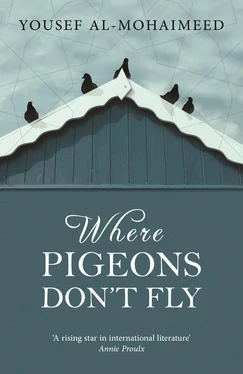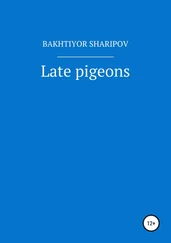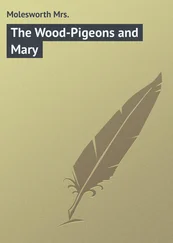Soha would quake when Fahd went missing for more than an hour, maybe because he was young and pale-skinned with an eye-catching coppery tone to his hair. She feared for him in the streets and alleys and from the attentions of her uncle’s children.
When the children were standing in front of the tall, hand-cranked washing machine, Yasser would play a game that Fahd found hard to understand, or rather he understood it, but enjoyed it, and so pretended he didn’t.
Yasser would try to pick him up from behind, lifting him so he could see his face in the mirror as he roared gleefully. But it was more than childhood fun and games. At noon one day, while the men snoozed before the afternoon prayer, Yasser led Fahd up to the roof to ‘fly pigeons’. He laughed when Fahd said, panic-stricken, ‘I’m scared!’ He assumed Fahd was scared of him, but what frightened him were pigeons, cats and any domesticated animal. Yasser pointed through the coop’s netting to the nest boxes.
‘The one with the fat breast: see her? That’s Velvet. The one standing over there is Fickle and next to her is Dancer. Look at her chick inside the shelter.’
‘Where?’ cried Fahd, backing away from the netting. ‘I don’t see it.’
Yasser followed him, throwing his dirty white ghatra on the ground.
‘You’re a dwarf. You’ll never grow,’ he said, and started pulling at Fahd from behind, lifting the little feet in their Riyadhi shoes off the ground so he could see the tiny fluffy chick. Fear started to prick at Fahd’s young heart, not only because of the pigeons, but also because of his cousin’s pigeon, which stirred wildly and hungrily rubbed against him. Fahd stood there silently then climbed downstairs, alarmed and bewildered.
His mother was not asleep like he had thought, but had put on her headscarf and the hooded robe she wore to pray and was standing by the door that opened on to the courtyard. The instant she felt him enter the room where his father was sleeping, she crept after him and beckoned him outside. He came out of the room and she led him to the empty women’s bedroom and started to interrogate him. ‘Where have you been?’
He lied to her for the first time in his life, telling her that he had been in the men’s majlis waiting for a guest of Uncle Saleh, but she looked for a moment at his green woollen thaub . He was wondering what she was looking at when she surprised him by asking, ‘Who were you with on the roof?’
Then suddenly Fahd broke down and wept and told her what had happened. He felt guilty, scourged by sin, as his mother plucked up a small white feather stuck to the bottom of his clothing.
— 11 —
THE AFTERNOON OF THE day after his uncle’s visit, while Lulua lay on her back watching Sally , Fahd was in the men’s majlis with his schoolbooks, revising for his end of year exams. His mother slipped silently into the room so as not to break his concentration, placing a pot of tea on the table next to him, and before she could leave he invited her to sit for a while.
He had no idea how he would tell her what had happened. She might feel guilty herself for upsetting him and involving him in her problems, she might not be the slightest bit bothered, and she might lash out at those around her. He had no idea how she would respond. She had been suffering bouts of breathlessness since Suleiman had passed away three months previously.
‘Do you know why my uncles came yesterday?’
‘You lied to me, Fahd? My heart told me you were hiding something!’
He started to tell her what the men were planning: how her well-being had become a legal duty, as though they had evidence of her conducting secret liaisons with strangers, or someone had said that they saw strange men entering the widow’s house at noon, while her children were at school.
There was a long and dreadful silence, as though she were looking back over her life and what had happened to her. Her distracted air was intensely provoking to her son, and wheedling suspicions began to circle his heart, goading him like a switch on a stubborn donkey: Was there something linking her with a man other than his father? Had she been so sad and silent these last few years because she was torn between his father and another? Was it possible that his uncle had won her heart, and she his, all those years ago when they were staying in his house in Buraida, fleeing the madness of war? Fahd raised his face to the ceiling: No. I take refuge with God from doubt and uncertainty!
After a full minute of silent contemplation Soha suddenly started to wail. How could they think of this with her husband so recently laid to rest, the soil over his grave not yet dried by the sun? How could she forget Suleiman’s smile, his playfulness and his laughter? How could she forget his voice as he read her verses by Abu Tammam and al-Mutannabi and the poems of Mahmoud Darwish, especially Ahmed the Arab and Praise for the Lofty Shadow , which he had memorised from a cassette tape given to him by Nabeel Hawamla? And how could they forget how they had mistreated Suleiman from the day of his birth to his death? Were they intent on wronging him even after he was gone?
After Suleiman left prison and was back in Buraida, and once Eid al-Fitr had come to an end, his family arranged a job for him as a correspondent for a small contracting company. Ali al-Safeelawi dashed round to all the families he knew and whose men he trusted in order to get his son engaged in quick order, lest he be drawn after some new dream and lead his family into even more trouble than before. Ali wasn’t that worried about Suleiman going to jail, or even being killed, but he did fear the scandal that had caused one man in Buraida to mock him in a packed majlis . He had walked out and now avoided male company.
The families did not answer his plea. A very few confronted him with reality: the reality of the jail in which the expectant groom had languished and the fact that people like that never gave up their ideas, which flowed from them like blood.
‘We don’t want our grandchildren to become orphans with no one to provide for them,’ said some. Those who were more diplomatic and considerate of Ali’s feelings said simply, and with blatant dishonesty, ‘The girl’s taken.’
And so Suleiman left his family and his two-faced city forever. Sensing his father’s frustration and his concern for the family’s honour he decided to relieve him of the burden of his presence and asked his permission to seek a living somewhere else. He returned to Riyadh to work as a driver for a press distribution company, where he had the job of delivering newspapers to government offices. The streets of Riyadh were not as wide as they are now but nevertheless he spent his whole day trekking back and forth between various government agencies, sometimes forced to wait at this building or that because the guard wasn’t around to receive the stacks of six daily newspapers. He would spend a few minutes perusing one of the papers as the voice of Umm Kulthoum swelled inside the car, sedate and pleasant in the early morning.
Sometimes he would go for a stroll with a middle-aged guard from Jazan, who worked at one of the agencies and would tell him what went on in this ministry or that institution; how the employees fought over the newspapers and the minister himself had to distribute them himself in instalments. With his yellow teeth and creased orange headscarf the guard would chuckle, ‘The minister and his deputy have given up public affairs and are working as newspaper boys.’ Then he would withdraw to the stove in his room to make tea for himself and Suleiman.
‘They all go home at midday.’
On more than one occasion as he stood outside the Presidency for Girls’ Education near the television building, waiting for someone to open the door, Suleiman had seen a middle-aged man dressed in a smart suit, tie-less, with sparse hair and a thick blonde moustache sprinkled with white, adjusting his spectacles as he sat on a sheet of paper on the edge of a plant pot that held an ancient thorn tree. He had a small paper bag, out of which drifted the smell of fried falafel, and he turned the pages of Sharq al-Awsat with interest. At first, Suleiman assumed he was some sub-editor who came early for some complex reason of his own, but after an entire month had passed he was certain that the man worked in the Presidency.
Читать дальше












